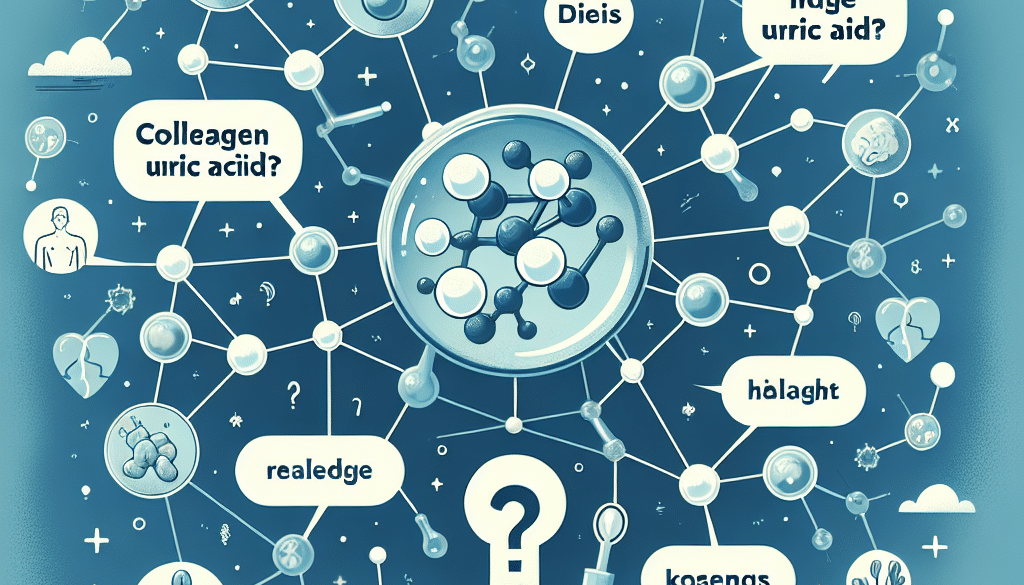Does Collagen Increase Uric Acid? Health Concerns Addressed
-
Table of Contents
- Collagen and Uric Acid: Exploring the Health Implications
- Understanding Collagen and Uric Acid
- What is Collagen?
- What is Uric Acid?
- Does Collagen Increase Uric Acid?
- Collagen Metabolism and Purines
- Research Findings
- Case Studies and Anecdotal Evidence
- Health Concerns Related to High Uric Acid
- Gout and Arthritis
- Kidney Stones and Renal Function
- Cardiovascular Disease
- Precautions and Recommendations
- Conclusion: Weighing the Benefits Against Potential Risks
- Discover ETChem’s Premium Protein Products
Collagen and Uric Acid: Exploring the Health Implications

Collagen supplements have become increasingly popular for their purported benefits on skin health, joint function, and overall wellness. However, with the rise in consumption of these supplements, concerns have emerged regarding their potential impact on uric acid levels in the body. Elevated uric acid is associated with gout, a painful form of arthritis, and other health issues. This article delves into the relationship between collagen intake and uric acid levels, addressing common health concerns and providing insights based on current research.
Understanding Collagen and Uric Acid
Before examining the potential link between collagen and uric acid, it is essential to understand what these substances are and their roles in the body.
What is Collagen?
Collagen is the most abundant protein in the human body, providing structure to skin, bones, tendons, and other connective tissues. It is composed of amino acids, the building blocks of proteins, which are essential for maintaining the integrity and elasticity of various body parts.
What is Uric Acid?
Uric acid is a waste product formed from the natural breakdown of purines, which are substances found in many foods and also produced by the body. Normally, uric acid dissolves in the blood, passes through the kidneys, and is excreted in urine. However, if the body produces too much uric acid or does not eliminate enough of it, it can build up and form sharp, needle-like urate crystals in a joint or surrounding tissue, leading to gout.
Does Collagen Increase Uric Acid?
The question of whether collagen supplementation leads to increased uric acid levels is a complex one. To address this concern, we must look at the composition of collagen and how it is metabolized in the body.
Collagen Metabolism and Purines
Collagen is rich in the amino acids glycine and proline but is not a direct source of purines. However, the metabolism of amino acids can indirectly affect the production of purines and, consequently, uric acid. The breakdown of amino acids in the body can lead to the production of purines, which are then converted into uric acid.
Research Findings
Studies on the impact of collagen supplementation on uric acid levels are limited. Some research suggests that high-protein diets, in general, may increase uric acid production due to the breakdown of purines from protein sources. However, these studies often do not differentiate between various types of protein, such as collagen versus other animal proteins that may be higher in purines.
Case Studies and Anecdotal Evidence
There have been anecdotal reports of individuals experiencing gout flare-ups after beginning collagen supplements, but these cases are not sufficient to establish a causal relationship. More rigorous scientific studies are needed to determine if there is a direct link between collagen intake and increased uric acid levels.
Health Concerns Related to High Uric Acid
Understanding the potential health risks associated with high uric acid is crucial when considering collagen supplementation.
Gout and Arthritis
The most well-known condition associated with high uric acid is gout, which can cause severe pain, redness, and swelling in the joints. Chronic gout can also lead to joint damage and loss of mobility.
Kidney Stones and Renal Function
Excess uric acid can lead to the formation of kidney stones, which can cause pain and interfere with kidney function. In severe cases, high uric acid levels can contribute to chronic kidney disease.
Cardiovascular Disease
Some studies have linked high uric acid levels to an increased risk of hypertension and cardiovascular disease, although the exact mechanisms are not fully understood.
Precautions and Recommendations
For individuals concerned about uric acid levels, there are several precautions and recommendations to consider when taking collagen supplements:
- Consult with a Healthcare Provider: Before starting any new supplement regimen, it is important to discuss it with a healthcare provider, especially for those with a history of gout or kidney issues.
- Moderation and Balance: If choosing to take collagen supplements, it may be wise to do so in moderation and as part of a balanced diet that is not excessively high in purines.
- Hydration: Staying well-hydrated can help the kidneys flush out uric acid and reduce the risk of kidney stones.
- Lifestyle Changes: Maintaining a healthy weight, limiting alcohol consumption, and avoiding high-purine foods can also help manage uric acid levels.
Conclusion: Weighing the Benefits Against Potential Risks
In conclusion, while there is no definitive evidence that collagen supplements directly increase uric acid levels, individuals with a predisposition to gout or kidney problems should approach collagen supplementation with caution. It is essential to consider the potential risks and benefits and to consult with a healthcare provider. A balanced approach to diet and lifestyle can help mitigate concerns related to uric acid while still allowing for the potential benefits of collagen.
Discover ETChem’s Premium Protein Products
If you’re looking for high-quality protein supplements, ETChem offers a range of collagen products that cater to various needs. Their commitment to quality ensures that you receive the best possible product for your health and wellness goals.
About ETChem:
ETChem, a reputable Chinese Collagen factory manufacturer and supplier, is renowned for producing, stocking, exporting, and delivering the highest quality collagens. They include marine collagen, fish collagen, bovine collagen, chicken collagen, type I collagen, type II collagen and type III collagen etc. Their offerings, characterized by a neutral taste, instant solubility attributes, cater to a diverse range of industries. They serve nutraceutical, pharmaceutical, cosmeceutical, veterinary, as well as food and beverage finished product distributors, traders, and manufacturers across Europe, USA, Canada, Australia, Thailand, Japan, Korea, Brazil, and Chile, among others.
ETChem specialization includes exporting and delivering tailor-made collagen powder and finished collagen nutritional supplements. Their extensive product range covers sectors like Food and Beverage, Sports Nutrition, Weight Management, Dietary Supplements, Health and Wellness Products, ensuring comprehensive solutions to meet all your protein needs.
As a trusted company by leading global food and beverage brands and Fortune 500 companies, ETChem reinforces China’s reputation in the global arena. For more information or to sample their products, please contact them and email karen(at)et-chem.com today.

